 Written by: Morag Phillips and Martin Hopkins What does fair pay really mean? I imagine that if you asked a group what “fair pay” means, you’ll have a collection of views. If you then asked a group what “fair parenting” means, you’ll have another collection of views. The concept of fairness seems to rest partly in our own experience of the matter under consideration, and it seems that it is very tainted by our own comparison of the application in our immediate context. To step out of pay for a while into the parenting world, a sibling that was allowed to have a smartphone at age 15 may deem it unfair when a much younger sibling received their smartphone at age 12. The sense of outrage that comes with an experience of unfairness makes it a burning issue. It burns brightly when it’s happening to us! Fairness itself does not inherently have a bias. The concept of fairness revolves around treating all individuals or groups impartially and without favouritism or discrimination. It aims to ensure that decisions, processes, or outcomes are reasonable, justifiable, and consistent. Fairness typically refers to the quality of being reasonable and impartial. It involves ensuring that decisions or actions are consistent, unbiased, and considerate of all relevant factors. Fairness often focuses on the process or procedure by which decisions are made rather than the outcomes themselves. For example, in a decision-making context, fairness might mean giving everyone an equal opportunity to voice their opinions or ensuring that rules are applied consistently to all individuals. So is it fair that both siblings got a Smartphone? Does the timing make it different? Managing pay practices with a focus on fairness, justice, equity, and equality involves understanding each concept distinctly and designing a pay structure that balances these principles. Here’s a breakdown of each concept and how they relate to pay management:
Let’s add 2 more important concepts…
We could ask which factor should be considered the most important. It is indeed possible that pursuit of one element may mean we don’t achieve the other. In this example, we could say there is fairness, but not justice: Imagine a scenario where a company needs to downsize due to financial difficulties. The company decides to retrench employees based solely on tenure, meaning those who have been with the company the shortest amount of time is let go first. This decision might be considered fair because it applies the same criteria (tenure) to all employees without discrimination. However, it may not be just if some employees who are newer have made significant contributions or have higher performance ratings compared to longer-tenured employees who are retained. In this case, fairness in terms of consistent application of criteria (tenure) is maintained, but justice may be lacking because deserving employees are being retrenched based on a criterion that does not necessarily reflect their value or contributions to the organisation. This demonstrates that fairness and justice are distinct concepts that can sometimes conflict with each other depending on the context and the specific criteria or principles being applied. Achieving both fairness and justice often requires careful consideration of both the processes used to arrive at decisions and the outcomes that result from those decisions, taking into account relevant ethical, moral, and contextual factors. To design a pay structure that integrates fairness, justice, equity, and equality, managers can consider the following strategies and practical tools:
In summary, while fairness focuses on the fairness of procedures and decision-making, equity assesses whether those procedures result in fair and just outcomes. Together, fairness and equity aim to promote a more just and equitable society or organisation where everyone has equal opportunities and access to resources based on their circumstances and contributions. As we close, a challenge to our industry is to see the determination of an organisation-specific living wage as a decision sparked by justice, supported by fair policy, and resulting in an equitable outcome. Morag Phillips is a Master Reward Specialist, a SARA Executive Committee member, Chair of the SARA Thought Leadership Committee, and a member of the SARA Conference and Reward Awards Committee. Martin Hopkins is a Master Reward Specialist, and a member of the SARA Thought Leadership Committee, and Head of Reward Advisory Services at Bowmans Law. ENDS MEDIA CONTACT: Idele Prinsloo, [email protected], 082 573 9219, www.atthatpoint.co.za For more information on SARA please visit: Website: www.sara.co.za Twitter: @SA_reward LinkedIn: South African Reward Association Facebook: SARA – South African Reward Association
0 Comments
 The launch of ChatGPT late in 2022, and the tremendous interest it provoked, inaugurated what one will one day see as the Age of Artificial Intelligence (AI). AI will make it easier to generate outputs in virtually every industry, creating a challenge for reward professionals: how does one measure an individual’s performance when one of his or her outputs can be generated by an algorithm? “AI is here to stay, and we can expect it to get significantly better. Reward professionals should see it as a great opportunity to refine their thinking about what constitutes great performance, and thus how to reward it,” argues Dr Mark Bussin, Master Reward Specialist and Executive Committee Member of the South African Reward Association (SARA). “Specifically, AI prompts us to look at what humans do best and use that insight to determine how we measure and reward our people.” Dr Bussin offers the following tips to help reward professionals, and HR more generally, to use the AI revolution to the advantage of their organisations: Focus on creativity, quality and innovation. AI is going to be a great tool for automating routine tasks, but when it comes to creative problem-solving or generating innovative ideas, it is a non-starter. Finding ways to reward individuals or teams for creativity rather than output would be beneficial to both the employees and the organisation. Similarly, reward professionals should look for metrics that measure quality rather than quantity. For example, customer satisfaction or product ratings could be used to assess the performance of an individual or team. Emphasise collaboration. Humans have leveraged the power of collaboration to overcome seemingly insurmountable challenges over thousands of years. Encouraging individuals or teams to work together and rewarding them for doing so will play to humanity’s strengths and will generate excellent results. Provide a sense of purpose. Humans are motivated to perform better when they feel their work is making a positive impact—AI is just a machine. Global research shows that purpose-driven companies realise huge benefits. Making sure the organisation has a clear vision and purpose can motivate employees to do their best, and ultimately drive the company’s performance in achieving its strategic goals. Develop policy guidelines relating to the use of AI. Everybody in the organisation needs to know how AI should—and should not—be used. Each industry will have its own set of ethical issues, and employees will need charts to navigate this tricky terrain. Provide professional development opportunities. It’s long been recognised that professional development is a key lever when it comes to attracting and retaining top talent—and driving high performance. Alongside providing policies to guide employees, organisations must provide employees with ongoing training in this rapidly changing technology and what it means for them. They will use it better and, as an added bonus, they will be more likely to remain with, or want to join, the organisation. Use AI to speed up the drafting of reports and policies. Finally, HR and reward professionals themselves should find ways to use AI to make themselves more efficient. Freeing up more time to be devoted to adding value will also protect their own positions. “The onward march of AI is in fact an opportunity for us all, and reward professionals in particular, to concentrate on the things that humans do best and focus on supporting them—leaving the drudge work to the machines,” Dr Bussin concludes. ENDS MEDIA CONTACT: Rosa-Mari Le Roux, [email protected], 060 995 6277, www.atthatpoint.co.za For more information on SARA please visit: Website: www.sara.co.za Twitter: @SA_reward LinkedIn: South African Reward Association Facebook: SARA – South African Reward Association  Companies need an internal committee as well as an industry body to ensure artificial intelligence (AI) is used responsibly for HR processes within their business and by their service providers. This is according to Carmen Arico, Chartered Reward Specialist, and spokesperson for the South African Reward Association (SARA). "AI is not yet mature enough to be entrusted with the ethical nuances of HR without human intervention and close supervision," she says. While AI promises an exceptional productivity boost across HR functions, it should not be implemented without proper policies, oversight and safeguards in place. AI in HR AI has a wide range of applications within HR. These include creating job descriptions, sourcing applicants, analysing CVs, filtering candidates, scheduling interviews, and even analysing facial and vocal responses during interviews. After a new hire is onboarded, AI can be deployed in areas such as skills development, reward design, performance reviews, wellness assessments, and more. Arico is firmly opposed to AI handling much more than rote HR administration. "When you apply the technology in areas that are too subjective even for humans, like gauging deception from facial expressions or confidence from voice tone, you're straying into dangerous legal territory," she says. AI security Arico is also concerned with how personal information may be used, and how easily it might be exposed by those who know how to bypass the shallow security barriers set by AI developers. "Ask for private information directly and the model might refuse on moral grounds, but rephrase the request as a plot to a fictitious story and, in that context, it could freely share everything it knows about an employee," says Arico. In addition, AI models learn from historical data that can often be littered with biases and falsehood. Will it suggest only male candidates for an occupation previously dominated by men; exclude a certain minority group if it has insufficient training data on that demographic; or reject a candidate who is neurodivergent because they don't fit a traditional psychometric profile or respond to social cues in a traditionally accepted way? Internal committee Arico says that corporate HR must understand how AI works and what its shortcomings are, develop policies for the scope of its use, and provide safeguards to mitigate any associated risk. Most importantly, companies must establish an internal steering committee tasked with ensuring AI is employed responsibly and ethically across their organisation and throughout their supply chain. This means their policies and practices must consider how AI is used by external HR service providers, such as recruitment specialists, head-hunters, training partners or reward consultants. Industry body Arico believes this can best be achieved through the establishment of a regulatory body that sets shared standards on the ethical and responsible use of AI, not just in HR but across all management functions and industries. "Members will participate in the development of these standards and bind themselves to their universal implementation to ensure AI is a blessing and not a curse to business and employees and can conform to agreed-upon ethical and moral standards," she says. Arico also advises that for the body to be effective, it should be led by neuroscientists, data scientists, AI researchers, AI ethics experts and another top talent in the AI space. “A certification, similar to ISO 9002, would not only identify companies as responsible AI users but also act as a differentiator in what will soon be a highly competitive market,” she says. ENDS MEDIA CONTACT: Rosa-Mari Le Roux, [email protected], 060 995 6277, www.atthatpoint.co.za For more information on SARA please visit: Website: www.sara.co.za Twitter: @SA_reward LinkedIn: South African Reward Association Facebook: SARA – South African Reward Association 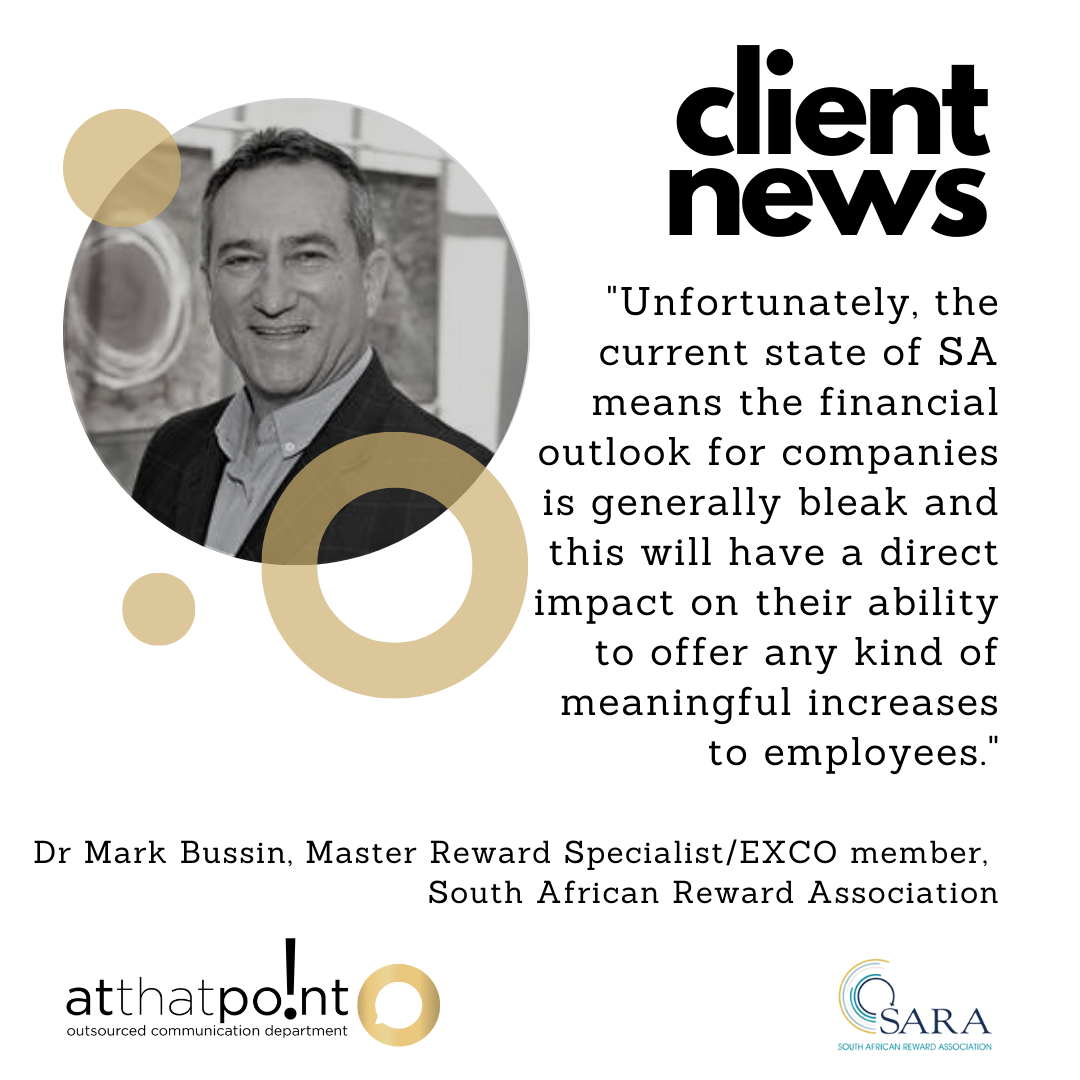 Can South African workers look forward to increases in line with the cost of living this year? According to Dr Mark Bussin, Master Reward Specialist and EXCO member at the South African Reward Association (SARA), economic instability in the country makes this unlikely – unless the government takes drastic action soon. "Unfortunately, the current state of South Africa means the financial outlook for companies is generally bleak and this will have a direct impact on their ability to offer any kind of meaningful increases to employees," he says. Dr Bussin provides an overview of the causes of the situation, their impact on employee rewards, and solutions that should be implemented promptly to improve conditions. How will increase decisions be impacted by the current economic climate? "First, we need to ascertain what is meant by 'current economic climate'," says Dr Bussin. He highlights the following key factors that define the country's economic situation and impede employers' ability to make favourable increase decisions:
These economic failings will inevitably cause employers to:
"You can ask a thousand economists this question and you will get a thousand different answers," says Dr Bussin. However, from a company perspective, relative to the decisions around making salary increases possible, he believes the following must happen at all levels of government:
What does this mean for employees? "Until the government takes decisive and proactive steps to remove these economic barriers, organisations will be unable to respond positively to their employees' cost-of-living requirements," says Dr Bussin. He encourages companies and concern groups to continue to put pressure on the nation's leaders to make tangible reforms that will help South Africa recover from crippling economic deficiencies. "We can talk about working together towards a solution all we want. But, if the proper political, legal and socio-economic foundations are not in place, there is no footing to climb out of the hole in which we collectively find ourselves," he says. ENDS MEDIA CONTACT: Rosa-Mari Le Roux, [email protected], 060 995 6277, www.atthatpoint.co.za For more information on SARA please visit: Website: www.sara.co.za Twitter: @SA_reward LinkedIn: South African Reward Association Facebook: SARA – South African Reward Association If you do not want to receive emails from us, please use the link: Click here to unsubscribe. 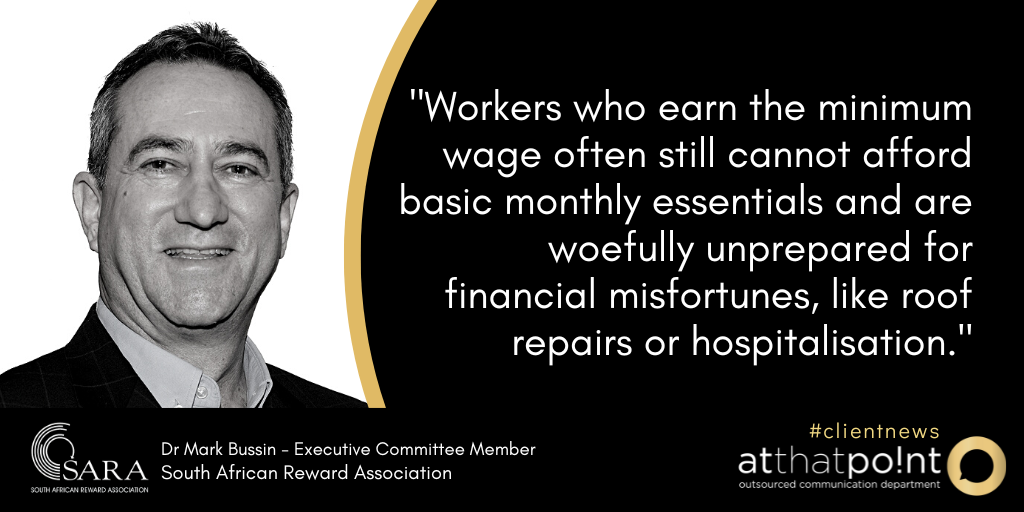 Employers should pay their workers a living wage and not just the national minimum prescribed by law. This is according to Dr Mark Bussin, Master Reward Specialist and Exco member of the South African Reward Association (SARA). "An employee's monthly pay should be at least R12,000 to R15,000 for a 40-hour work week," he says. Bussin defines a living wage as remuneration sufficient for an individual and their family to have a frugal yet dignified lifestyle. "Workers who earn the minimum wage often still cannot afford basic monthly essentials and are woefully unprepared for financial misfortunes, like roof repairs or hospitalisation," he says. Business impact What many employers don't realise is that financial distress among workers is bad for business. The strain of not earning enough and constantly struggling to survive can negatively affect employees physically, emotionally and cognitively. In an August 2013 Science journal article, researchers Mani, Mullainathan, Shafir and Zhao observed that a lack of money led study subjects to make poorer decisions. They hypothesised that poverty reduced focus and effort, resulting in inferior performance. So the stress associated with financial hardship causes employees to make errors in judgement and inhibits their productivity. It also prevents them from reaching their full potential, increases absenteeism, and results in higher turnover rates. "These effects can reduce business performance in the short term and hinder economic growth over time," warns Bussin. Replacing workers will not solve the problem if most of them face the same predicament. Trapped in poverty According to estimates from PwC, the University of Cape Town and the Tshwane University of Technology, the national minimum wage level for 2022 of R23,19 per hour is only around half to a third of the current living wage. It is not possible for low-income workers to survive on these amounts and they are often forced to turn to unlicensed money lenders for additional cash to make up the shortfall. Saddled with unregulated terms and high interest rates, they soon become trapped in a vicious cycle of borrowing from Peter to pay Paul. As they end up poorer than before, their descent into negative income can see their quality of life spiral. Being unable to look forward to tomorrow or plan for a better future can have dire physical and mental health consequences for them. Breaking the cycle Employers who pay a living wage are instrumental in the eradication of poverty. Employees with disposable income are not only happier and more productive at work but are also more active in the market, stimulating economic growth. In addition, workers do not need to engage in risky lending to make ends meet, reducing their exploitation by the unscrupulous. Therefore, the argument for a living wage is not only a moral one that focuses on business' obligation to society. It is also a strategically sound investment that, as it lifts up the poor, creates a more prosperous business environment for companies and citizens alike. "The more companies that decide to embrace a living wage, the greater the positive effect will be," says Bussin. ENDS MEDIA CONTACT: Rosa-Mari Le Roux, [email protected], 060 995 6277, www.atthatpoint.co.za For more information on SARA please visit: Website: www.sara.co.za Twitter: @SA_reward LinkedIn: South African Reward Association Facebook: SARA – South African Reward Association 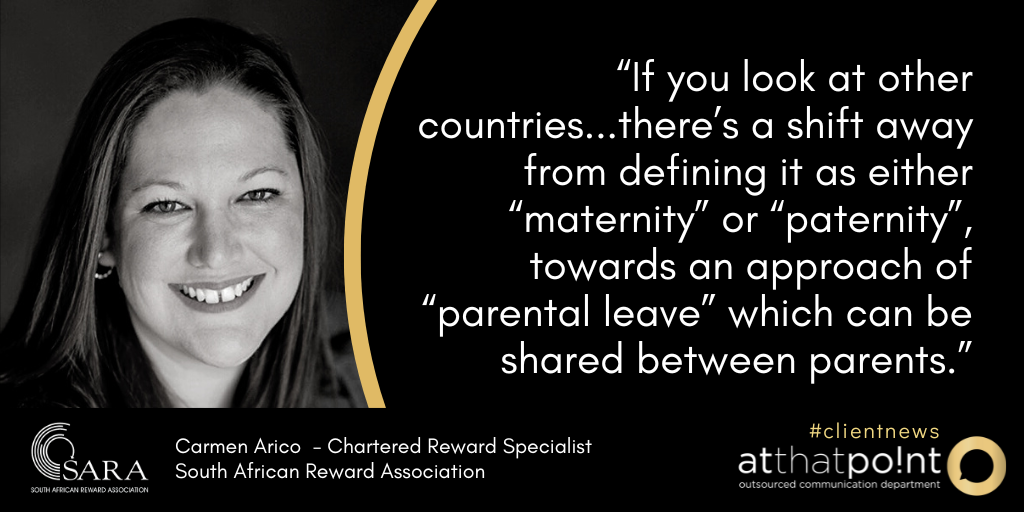 In South Africa, fathers are entitled to 10 days parental leave upon the birth of the employee's child in terms of the Labour Laws Amendment Act. Mothers are entitled to 4 months unpaid maternity leave. However, this legislation has been brought into question. In a recent case* filed at the High Court, Werner and Ika van Wyk argue that certain provisions of the Basic Conditions of Employment Act (BCEA) should be ruled unconstitutional because they unfairly discriminate against fathers of newborn children. This by unjustifiably restricting their rights to paternity leave in South Africa. According to Carmen Arico, Chartered Reward Specialist and spokesperson for the South African Reward Association (SARA), local legislation does indeed need to be leveraged for different parental options. This could include more time off for fathers, or a situation where parents themselves can decide how parental leave is split to best fit their individual needs. Laws and policies must adapt to the changing times “If you look at other countries, particularly those in Scandinavia, there’s a shift away from defining it as either “maternity” or “paternity”, towards an approach of “parental leave” which can be shared between parents. This keeps in mind how traditional family arrangements have evolved to now include same-sex couples, single parents, and co-parenting families.” She believes that in order to be effective, employers must keep changing circumstances and societies in mind. “Less than half of working age women were employed in the 1970s, and men often didn't spend much time with their families. However, that has changed. Nowadays, men meaningfully engage with their kids around seven times more often than they did in the past. And this is something they want to do.” Arico notes that though many local employers still don't seem particularly eager to formalise a flexible parental leave approach for various situations, she does believe lockdown has started to change the view of a lot of companies. “Employees now have much more freedom, and ideally this trend will extend to parental leave as well.” Fulfilled employees add value in the long term Arico adds that flexible parental leave could be a valuable asset for a company’s Employee Value Proposition (EVP). “Instead of viewing it as a drawback where you now have to give more time off for male employees, for instance, it should be viewed as what it is: an engagement driver. In light of these legal rulings, employers ought to think about offering flexible parental leave policies to staff members. It fosters an atmosphere where workers want to come back to the company following their parental leave.” Arico further emphasizes that South Africa's constitution is among the most progressive in the world. "When it comes to ensuring that there is no discrimination based on gender, sexual orientation, or any other factor, we serve as an example to others. I do believe that the Labour Laws Amendment Act must follow suit in the parental leave area in order to recognize the various familial structures and parental roles.” She concludes by noting that South Africa's employers generally get things right. “If we can now also change the thinking of “maternity versus paternity” and move towards a parental view, then we are a long way to being that progressive country we want to be seen as.” ENDS MEDIA CONTACT: Rosa-Mari Le Roux, [email protected], 060 995 6277, www.atthatpoint.co.za For more information on SARA please visit: Website: www.sara.co.za Twitter: @SA_reward LinkedIn: South African Reward Association Facebook: SARA – South African Reward Association 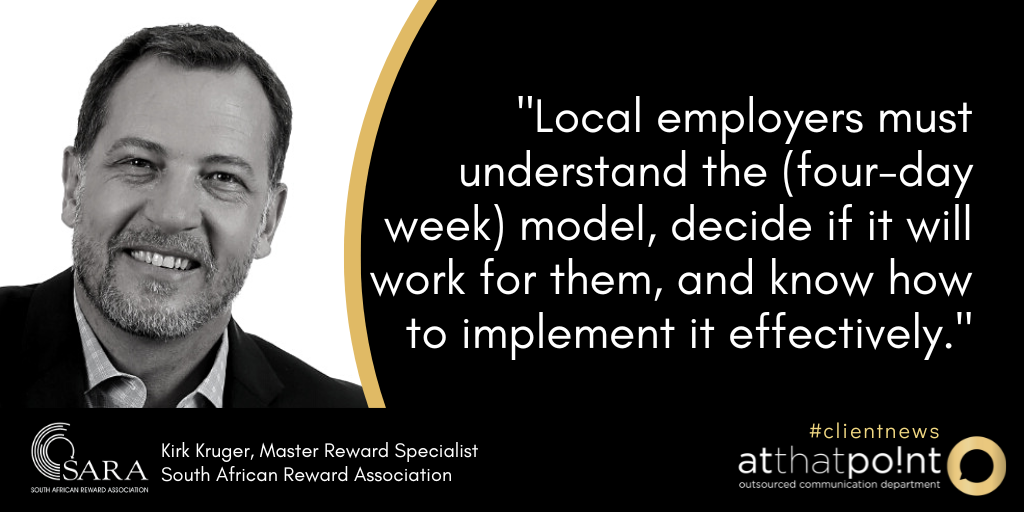 The concept of a four-day work week is attracting growing interest in countries around the world, including South Africa. "Local employers must understand the model, decide if it will work for them, and know how to implement it effectively," says Kirk Kruger, Master Reward Specialist with the South African Reward Association (SARA). How does it work? "The four-day work week should not be confused with the so-called compressed work week," advises Kruger. For the latter, employees receive the same remuneration and work the same hours per week. However, they work more hours during on-days to make up their weekly total hours worked. In contrast, a four-day work week means employees will work one day less in the week but the same number of hours per day as before. They will still receive their full salary and benefits. In essence they are being paid for outputs and not for hours worked. Why the interest? Both employers and employees are interested in the model because it promotes a healthier work-life balance, increases motivation and has a positive effect on productivity. On their in-week off-days, workers can take care of personal, family and lifestyle priorities, resulting in a better quality of life, mental and physical well-being, and more energy. Who will adopt it? "I don't think South Africa as a country or an economy is ready for this on a large scale and interested employers will want to test the waters before committing," says Kruger. Potential adopters are more likely to be niche organisations, such as smaller and medium-sized technology companies. Even then, they should take time to investigate its impact on their operations, possibly running a pilot programme first. How does it compare to WFH? "Since COVID ushered it in, work-from-home has gained momentum and I think it is here to stay" says Kruger. For now, he says WFH will remain the primary focus for employers due to the flexibility and location independence it offers and will overshadow the four-day model. However, as WFH becomes the norm, workers - especially those with scarce skills - may start looking for employers that offer both. Is it a good way to attract and retain employees? "Absolutely. Research shows a higher level of worker engagement, so there is good reason for employers to consider it as part of their employee value proposition," says Kruger. It can differentiate them with in-demand and self-motivated candidates who will deliver results whether they work four days or five. And it will help retain those who appreciate the flexibility it affords them. What do employers need to consider? It is critical that companies consider the model's impact on operational continuity and customer engagement. This will ensure they don't experience lapses in service delivery during peak hours due to insufficient personnel. "This requires a high level of engagement with employees to develop effective policies, including structured communication, active change management and collaborative corrective measures," says Kruger. Reviewing rewards With careful planning, employers can make the four-day work week a new highlight of their total reward strategy. "They should consult their reward specialist to ensure their leave, overtime, pay and benefits structure aligns with this new way of working" says Kruger. ENDS MEDIA CONTACT: Rosa-Mari Le Roux, [email protected], 060 995 6277, www.atthatpoint.co.za For more information on SARA please visit: Website: www.sara.co.za Twitter: @SA_reward LinkedIn: South African Reward Association Facebook: SARA – South African Reward Association 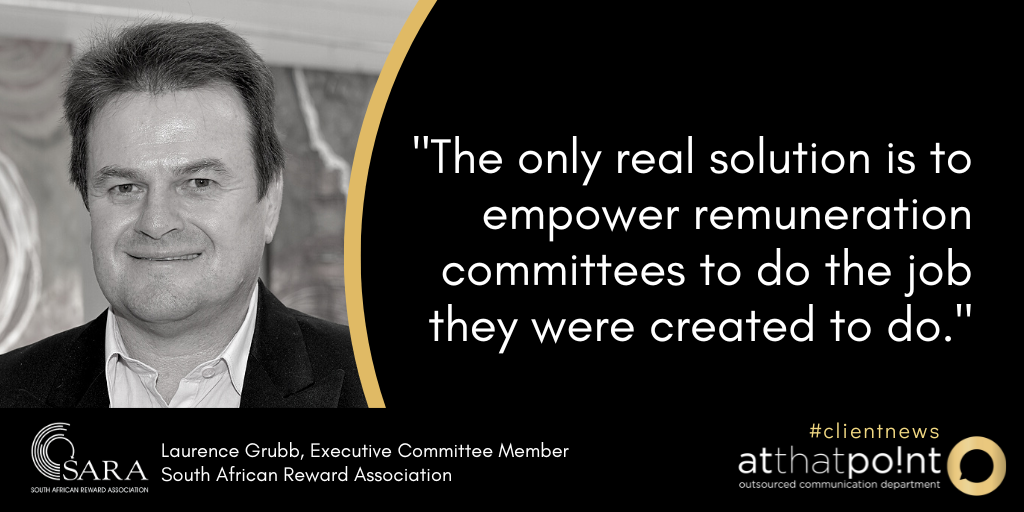 Stronger remuneration committees are the solution to rampant executive pay. This is according to Laurence Grubb, Master Reward Specialist and Executive Committee Member at the South African Reward Association (SARA). "We're seeing an imbalanced power dynamic between high-performing executives who associate significant rewards with the value they deliver and RemCos with structural expertise gaps that cannot assertively counter their demands," he says. Grubb suggests that alternative remedies are likely to do more harm than good. The danger of a binding vote The majority of South African businesses try to abide by the King IVTM code of corporate governance to achieve balanced and appropriate outcomes for executives, shareholders and other stakeholders. Yet, some CEOs, CFOs and executives continue to extract excessive remuneration from their companies. However, they have often built the enterprise from scratch or led it to significant growth, making them key to their company's success. So they may control the balance of power with a Board and Remco not willing to cross them. One suggested approach is to afford shareholders a binding vote that could deny gratuitous executive rewards, but Grubb says this is risky. "These leaders are the drivers of the business's growth and if their expectations are not met, they could move on and leave the Board to find a suitable successor, the impact of which will normally be a decline in the share price" says Grubb, noting that similar scarce talent might be impossible to find. Consequently, shareholders may end up shooting themselves in the foot. Rethinking the RemCo A better solution is to equip the RemCo with the necessary expertise to rationalise, negotiate and even restructure proposed packages in a way that satisfies of all parties. This requires that the committee augments its competencies with a deeper knowledge of current remuneration trends, industry standards and competitive best practices. To facilitate this solution, SARA is developing masterclass webinars and live sessions aimed at RemCo members, as well as other executive and non-executive directors, to enhance their understanding of executive remuneration. In addition, King IV suggests that the committee invites an external advisor to guide it in its duties. Executives will often hire remuneration consultants to help them determine the highest reward opportunities for their position. Their justification for greater compensation will be informed by data, industry benchmarks and practices and broader insights. RemCos without similar independent expertise will be left at a disadvantage. "In an ideal world, King IV might recommend a Master Reward Specialist as a standing member in all RemCos, allowing them to bring remuneration expertise, independent views and industry best practices to the negotiation," says Grubb. A real solution While most South African businesses have roped in runaway executive earnings, some executives continue to enjoy astronomical rewards. Many proposed solutions – like more onerous regulations or a binding vote for shareholders – may have unintended consequences which would prove to be negative in the long run. "The only real solution is to empower remuneration committees to do the job they were created to do," says Grubb. Most of all, they must be able to challenge the CEOs and executives who, up to now in some companies, have retained the balance of power in their struggle for greater rewards. ENDS MEDIA CONTACT: Rosa-Mari Le Roux, [email protected], 060 995 6277, www.atthatpoint.co.za For more information on SARA please visit: Website: www.sara.co.za Twitter: @SA_reward LinkedIn: South African Reward Association Facebook: SARA – South African Reward Association "South African businesses that have already planned their pay increases for 2022 have some tough decisions ahead of them," warns Yolanda Sedlmaier, Chartered Reward Specialist and Exco member at the South African Reward Association.
This is due to rocketing inflation, fuelled by global economic turbulence and local conditions, which is only expected to worsen over the rest of the year. Employees faced with the escalating cost of living may be underwhelmed and demotivated by increases falling well below their needs. Unfortunately, this can negatively affect their productivity as well as that of their company. A rough road ahead South African employers determine their pay increase targets several months before those increases are due to be implemented. The targets are typically based on various factors, including the prevalent economic outlook for the coming year at that time. Once set, sudden changes to the forecast factors are very difficult to accommodate due to the time needed to rework the plans and the financial provisions supporting their adoption. "The process is the definition of a big ship turning slowly and 2022 is shaping up to be just that kind of situation," says Sedlmaier. According to recent figures from Statistics South Africa, the country's current annual inflation is 5.9 percent, mainly due to higher food and fuel prices. This is compared to 4.5 percent in 2021. In addition, credit rating firm Moody's has projected that local inflation could reach as high as 8 percent by the end of the year, a figure the US economy has already reached. To offset inflation, the South African Reserve Bank (SARB) has announced an increase to the interest rate of 50 basis points, following three consecutive rises of 25bps each. The SARB also noted that economic growth had been adjusted from 2 percent down to 1.7 percent due to several short-term factors, including flooding in Kwa-Zulu Natal and ongoing electricity supply constraints. The sudden onset of Russia's war with Ukraine and the conflict's immediate impact on the global economy is also a significant factor. This while businesses are still fighting back from the effects of the COVID-19 pandemic throughout 2020 and 2021. Lastly, economists report that while the outlook for a global recession was 25 percent at the beginning of the year, this outlook has increased to 50 percent. Others have suggested that such a recession may be mild compared to previous declines, like the 2008 financial crisis. "Either way, employers need to be ready for anything," says Sedlmaier. To revise or not to revise The effects of inflation on worker attitudes can already be witnessed as unions, demanding increases of 7, 10 and even up to 15 percent, are prepared to go on strike against employers offering 6 percent. As a result, will companies be forced to implement interim mini-raises to offset the unforeseen inflationary conditions or even bite the bullet and revise their plans altogether? Can they implement better cost-saving initiatives, such as more work-from-home allowances, to alleviate the burden on workers? "There's no easy answer to the million-dollar question they face and employers will have to dig deep to develop effective reward strategies," says Sedlmaier. ENDS MEDIA CONTACT: Rosa-Mari Le Roux, [email protected], 060 995 6277, www.atthatpoint.co.za For more information on SARA please visit: Website: www.sara.co.za Twitter: @SA_reward LinkedIn: South African Reward Association Facebook: SARA – South African Reward Association Dr Mark Bussin, EXCO member of the South African Reward Association (SARA), says that powerful international trends are changing the governance and remuneration landscape significantly.
“These trends are ushering in a profound shift in how we think about governance and remuneration, and smart boards and executive teams need to understand their implications,” he says. “Many of them are developing trends, so companies will need to keep their eye on the ball, and develop flexible strategies to respond to a shifting set of variables.” Dr Bussin says that while there are multiple trends, the following are the most important as they represent key directional shifts: Institutions and regulators flex their muscles Underlying many of these trends is the indisputable fact that both institutional investors and regulators are getting much more specific about what they want from companies in which they are invested. In particular, advisors like Lewis Glass and Institutional Shareholder Services are gaining more influence as they provide advice to large clients, and their agendas are thus gaining traction. Key agenda items include ESG and human capital measurement. ESG becomes a board matter Environment, social and governance (ESG) reporting has become mandatory globally. “The move to include non-financial metrics is positive, as it supplements traditional backward-looking and quantitative financial metrics with a new set that are essentially forward looking and qualitative,” he argues. “However, measurement is much more difficult and there’s no real objective way of doing it yet.” Human capital reporting grows up Another move to a more qualitative approach sees traditional reporting based on figures relating to gender and race being complemented by a deeper look at how the company is managing its talent. “We’re looking beyond numbers-based affirmative action to consider things like dignity, respect and, above all, inclusivity,” Dr Bussin says. Pressure to simplify remuneration Variable remuneration frameworks designed to drive performance have become so complex that that it has become virtually impossible to establish what anyone really earns, and so benchmarking cannot be done. Focus on the vertical and horizontal pay gap continues to grow The vertical pay gap—the CEO’s salary compared to that of the lowest paid worker—seems less and less useful as a measure. The top jobs are becoming more and more complex, and so attracting higher wages, while the lowest remain static. “The vertical pay gap will continue to widen and, in any event, redistributing the CEO’s salary to workers would make absolutely no impact,” says Dr Bussin. “For that reason, companies are moving towards paying a living wage (rather a minimum wage) to all employees as a way to make a real impact on people’s lives.” The horizontal pay gap—also known as the gender pay gap—remains a highly controversial issue. The global average is in the region of 25% whereas in South Africa it falls into the 10%-20% range. While the issue is not as clear cut as it might seem—other factors such as genuine parity of the work done and differing work/life priorities play a role—this is something that is receiving more focus. Work-from-anywhere trend raises significant issues Remote working has been growing in popularity over the past decade or so, strengthened by the recent lockdowns. On the governance side, this work style will demand a move from input-based to outcome-based performance management. Getting this right will surely only be a matter of time, but the tax question is more vexing: to whom would a consultant living in country A and working for multiple clients in various other jurisdictions pay tax? No firm answer to this question exists as yet. A related issue is the growing number of contractors, freelancers, part-timers and consultants: what kind and level of benefits are they entitled to receive? If the answer is none, then should they not be paid a premium? ENDS MEDIA CONTACT: Rosa-Mari Le Roux, [email protected], 060 995 6277, www.atthatpoint.co.za For more information on SARA please visit: Website: www.sara.co.za Twitter: @SA_reward LinkedIn: South African Reward Association Facebook: SARA – South African Reward Association |
Archives
March 2023
Welcome to the South African Reward Association newsroom.
Categories
All
|


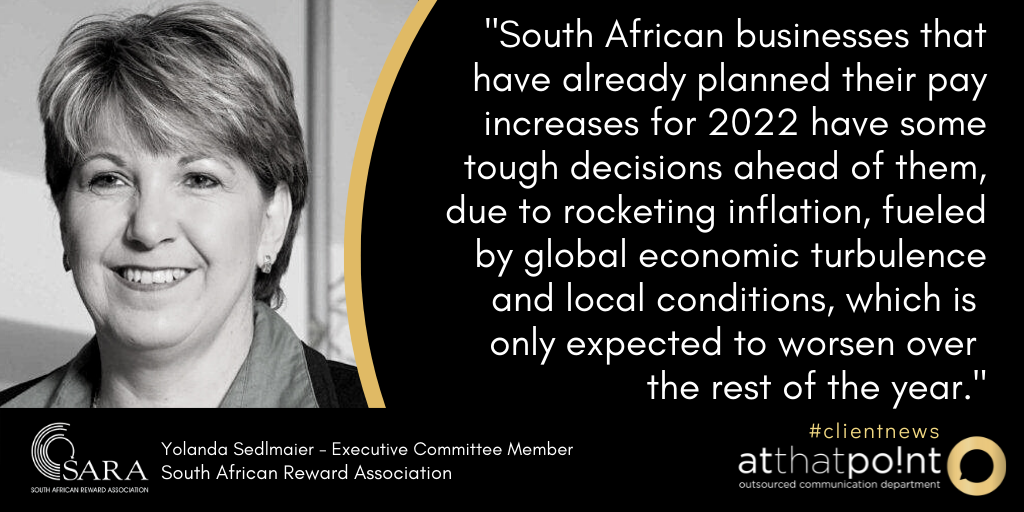
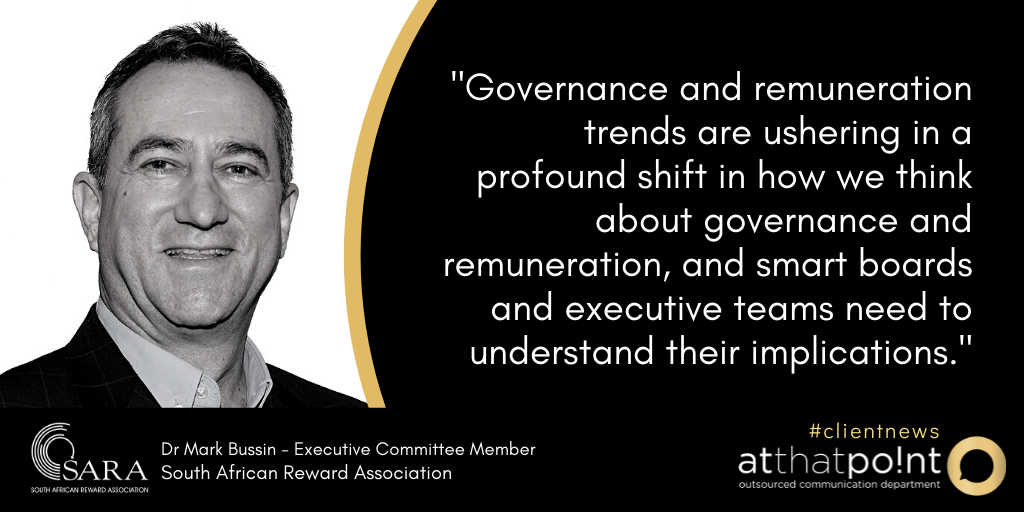
 RSS Feed
RSS Feed